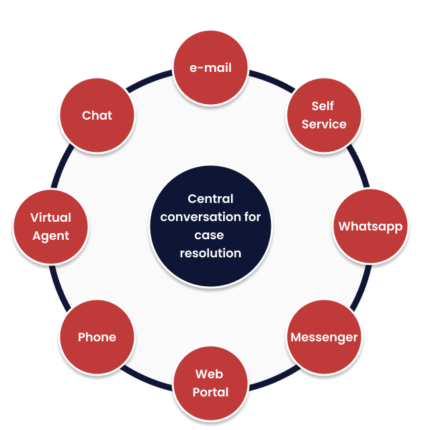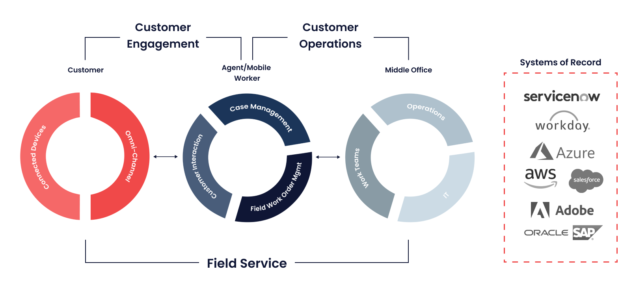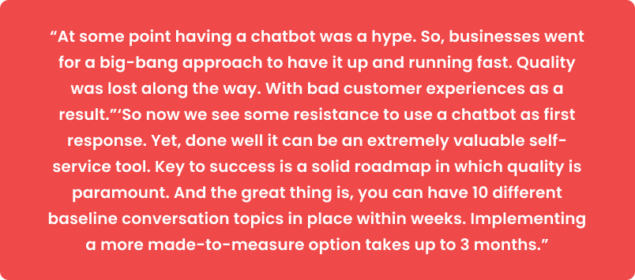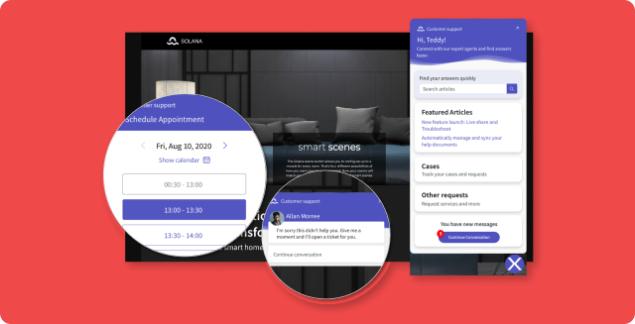Contactpersoon
Sebastian Tisch
CSM Consultant
ServiceNow CSM enables you to provide the ultimate omni-channel customer experience. It does so by ensuring customers can reach the service desk in any way that is most convenient for them. This ultimately includes e-mail, telephone, Messenger, WhatsApp, Facebook Messenger, Chatbot or web portal.
As fully scalable solution, ServiceNow CSM can mature along with the needs and requirements of your customer service. From the availability stage where customers can choose the preferred way of getting contact with customer service, to AI-driven problem fixing, through to driving customer loyalty by alerting customers to solutions.
Similarly, it increases efficiency for customer service agents by providing them a workspace built to resolve issues quickly, while raising customer satisfaction. As a result of the workflow, automation, and self-help features from ServiceNow, customer service agents get the information they need, when and where they need it to resolve or cases and even pre-empt problems.
In this way, ServiceNow CSM takes your customer service beyond problem and incident resolution to becoming an end-to-end, pro-active service provider that drives your business.


Omni-channel customer engagement
Make it easy for customers to engage and get answers where, when and how they choose. Level zero engagement through access to a knowledge base, community or a chatbot can cover the most common service cases and reduces case volume and costs.

Seamless communication
Fully integrated communication channels enable smooth communication with customers with a full view of their issues. Similarly, customer service is connected with multiple teams across the enterprise to drive resolution.

AI assistance
AI assisted recommendations help agents resolve issues better and faster. Monitor for and take action on potential issues with automatic case creation.

Pro-active communication
Automatic incident identification enables you to fix underlying issues to eliminate calls. Pro-actively notify customers about potential or actual incidents.
ServiceNow CSM is for all businesses that deliver customer services and are looking to maximize customer experiences and customer satisfaction with best services and after-care.
More often than not, products or services themselves are no longer leading in the perception of the customer. Customer loyalty is increasingly being driven by the service delivered with the product or service, including availability, after-care and more.
Yet, many customer service solutions offer an immature service model and in effect are just fancy ticketing systems. As businesses realize that customer satisfaction should be up there as one of their most important KPIs, the need for a solution that fulfils ‘the best service is no service’ mantra has become paramount.
ServiceNow’s platform offers a mature, scalable, cloud-based, end-to-end service model. Not only can customer service organizations track cases across channels, they can connect to back office teams to drive problems to permanent resolution and automate common tasks and customer requests.
A major benefit is that the solution is fully scalable to fit the precise needs of any organization: with a sweet spot of 1,000 to 3,000 employees. Integrations with systems of record and the ability to build custom apps help accelerate digital transformation. With lower costs, improved service quality, and higher customer loyalty as outcomes.
Having said that, if you’re not using ServiceNow at all and you want to use ServiceNow CSM as your first product, it might not be the best choice. Best is to include CSM in a broader roadmap that comprises the implementation of ServiceNow ITSM or Project Management so that you can get the most out the platform’s capabilities.
Key to any implementation is that you have a robust roadmap in place that defines a routing throughout your enterprise to cover and integrate your legacy systems.
Putting in place an excellent customer experience starts with a smooth customer journey, with intuitive and easy-to-use self-service tools, so that customers need to contact a live agent for exceptional questions only.
According to Aberdeen, the 3 main roadblocks that organizations face in setting up such a excellent customer experience are:

With ServiceNow CSM you boost customer experiences with connected and streamlined digital workflows. It provides you the tools required to meet the needs of customers looking to get everything faster, including products, services and customer care.
A vital part of enabling a quick, seamless, intuitive and positive customer journey is the ability to access, compile and analyze data from various sources right across your organization. After all, Customer Service Management does not end with the agent. There are multiple departments involved in solving a case.
In fact, whereas 40 to 60% of all cases are solved by agents, all the rest go deeper through the enterprise. The ability to route these issues seamlessly across your operations is one of the major benefits of ServiceNow CSM.
Higher costs and dissatisfied customers due to inefficient self-service options are inevitable if common customer requests are not automated or lack personalized self-service.
You need to automate common customer request, use the power of an AI-powered chatbot, and provide employees the knowledge they need to resolve issues and make work easier and more efficient. What’s more, modern and exceptional user experiences with personalized mobile apps and self-service will boost adoption.
Multiple, disconnected customer service channels and systems mean your customer service is siloed and unable to connect across teams or departments. It makes effective diagnosis and speedy resolution of customer issues impossible.
With ServiceNow CSM processes reaching from the front office to the back are fully automated. Tasks are routed across departments to the best employee and grouped with similar cases to speed up resolution. Your service agent gets guided resolution a single, at-a-glance window.
Many organizations are reactive: acting in the moment that an incident occurs. Typically, they are unable to monitor system health or performance, or notify customers pro-actively in case of non-performance or disruptions. Similarly, they are unable to identify service automation opportunities.
You need to let your service desk agents have a CRM that provides them with a 360-degree view of the customer. ServiceNow CSM provides just that, with all relevant data from CRM and ERP transformed into real-time, actionable insights and workflows.

Intelligent automation
According to McKinsey, companies who are embracing customer-experience analytics are redefining customer experiences. ‘Those with an eye toward the future are boosting their data and analytics capabilities and harnessing predictive insights to connect more closely with their customers, anticipate behaviors, and identify CX issues and opportunities in real time.’
“Using AI, machine learning and natural language understanding and processes – which also consider the context of an interaction – ServiceNow CSM benefits are enhanced even further. Such intelligent automation helps to better understand interactions with customers and even preempt problems in customer journeys by recognizing certain patterns or trends in cases.”
“Customers too are benefiting: think quick compensation for their delayed train, pro-active responses to fixing a problem or alerting them to solutions before they contact you.”
The scope of ServiceNow CSM is huge. This means that an implementation solution will be different for any organization. However, it is recommended to follow this 3-step approach that offers a simple and essential framework to achieving CSM excellence.
At the same time, it is essential for organizations to review the best sources of opportunity, pain points (or both) across existing customer journeys.
When starting off, it is important to have a clear roadmap as to how the insights gained through omni-channel, self-service and AI will be applied and to focus on a few specific use cases that will create immediate return. This could be reducing costs by having more cases solved by the front line, or improving agent efficiency or experience (which in turn will boost your customer experience).
Such a roadmap also helps point out those cases where ServiceNow is less suitable as solution. However, organizations who have already implemented ServiceNow ITSM or FSM ultimately stand to benefit in enabling best-in-class customer experiences.

A data-driven, predictive system such as ServiceNow offers a unique opportunity to tie customer experience strategies to tangible business value.
These are the strategies that should be embraced to streamline ServiceNow CSM implementation at any one level of the 3-Step Approach to CSM Excellence.
Besides the 3-step approach, our ServiceNow CRM experts have also collected five tips for a successful CSM implementation that you can read by clicking here .

Because the scope of industries and use cases for CSM is so vast, there are many features offered by ServiceNow to cover the whole CSM scope. Basically, ServiceNow offers 2 processes: order and service. These underpin and integrate all workflows involved in the customer service operation right across the enterprise.
For instance, a bank can have customer processes in place for getting information on a fund, or applying for a loan or mortgage. Every such process for each individual customer involves getting information to ensure a process runs smoothly. After all, any hiccup in the process will impact customer satisfaction.
Ideally, this means having in place customized processes that perfectly fit the customer profile, including preferred communication channels, account type and household details. Many companies struggle with mining such information and applying it to make such processes efficient.
ServiceNow makes it possible to build the case types as needed, so that processes are fit for optimized resolution. Also, where third parties are involved and siloed systems potentially
create obstacles to sharing customer case information and transparency into the third party’s operations, the single ServiceNow platform enables service performance across internal and external teams and departments.
The Account and Industry Data Models are, in this respect, particularly interesting features within ServiceNow CSM. They track complex relationships: between account and consumer (or a household of consumers), contact and consumer, or partner and company. It is even possible to track additional details such as branches and subsidiaries, and employees and third parties eligible for service. Besides tracking how these entities are linked, modeling helps determine other actions, including issue management of multiple customers, right down to providing self-service capabilities at the individual client level.
Another major benefit is the possibility to scale. Full integration with other ServiceNow tools such as Field Service Management, Customer Project Management, IT Operations or Project Portfolio Management enables scalability of your CSM as it matures.
Basically, the packages offered by ServiceNow reflect the 3-step Approach to CSM Excellence: enabling omni-channel services, boasting self-service and embracing AI and performance analytics.
There are as many customers as there are scenarios in which to implement ServiceNow CSM. Having said that, we do not recommend the implementation of CSM if you don’t already have ServiceNow within your organization. According to Gartner, ServiceNow CSM is best suited to the technology, services and government sectors.
Whatever sector your business is in, however, the basic use cases for ServiceNow are similar. They are:

Make it easy for customers to engage
By providing services anytime, anywhere, by any means.
Cut back case volume with self-service
Access to a self-service catalog, communities, knowledge base, virtual agent and portal will make customers able to help themselves.
Monitor issues and create cases automatically
Actively monitor products and services and take timely action on potential issues.
Assign task across the organization
Connecting multiple, siloed channels and systems to drive resolution and accountability.
Eliminate calls and lower costs
Adding predictive intelligence and AI to trace and fix underlying issues will enable you to act on trends and pre-emptively notify customers on issues.

And once implemented, there are even more scenarios and additional uses for creating business opportunities. For instance, from going beyond customer retention, to capturing new revenue by providing your sales force with a holistic view of accounts. With ServiceNow, your sales force will be able to get all the information they need directly, where they need it, in whatever solution they use to support the sales process. In this way, they gain the benefit of having a pro-active, value-adding edge on how and when to start a conversation with customers.
“One of the key ingredients of successful customer service operations is the orchestration of services to be available anytime, anywhere and by whatever means of communication.’
‘This inevitably also calls for enabling better and greater communication and collaboration across all business departments. You need to be able to route cases to the right people with the right skills. And moving forward, you need to provide intuitive access to performance data, context and customer history from knowledge bases. Not only to allow agents to solve problems more easily and customize offers, but also to enable customers to find answers to their questions.”
‘ServiceNow Customer Service Management increases efficiency for customer service agents and relieves other organizational departments of extraneous process steps spanning multiple platforms. Customer service sees fewer cases as a result of the workflow, automation, and self-help features from ServiceNow. But more importantly, agents can now address issues much faster while raising customer satisfaction scores.’
Among the key findings by Forrester were the following quantified benefits:
ServiceNow is a leader in the CRM Customer Engagement Magic Quadrant. ‘The ServiceNow products helps companies unite customer-facing teams and communication channels with back-office teams, processes and systems to resolve issues, proactively identify and fix problems, and simplify engagement in order to quickly handle customer requests. ServiceNow offers trend case management and knowledge management deeply integrated with digital products and services monitoring. ServiceNow should be considered by organizations that are, or are becoming, technological, asset-intensive and case-centric service organization with a need for flexible and elaborate workflow options.’
Gartner mentions the platform capabilities as one of the major strengths: ‘A robust platform with key capabilities within its IntegrationHub, and for asset management and real-time monitoring. Notable 2020 enhancements included a Process Automation Designer supporting cross-enterprise workflows, an IoT threshold monitoring for customer service and field service management use cases.’
Gartner further mentions that ServiceNow CSM ‘is best suited to the technology, service and government sectors.’ Customization can be complex and can ‘require the help of professional developers or other additional support. However, such help can enhance the value clients derive from ServiceNow’s product.’
![]()
ServiceNow’s IntegrationHub makes connecting CSM with your enterprise systems a matter of click and connect. Using so-called ‘spokes’ you can connect across programs and departmental silos to create streamlined, end-to-end digital workflows from the front-through to the back office, from finance to HR to resolve customer issues quickly. We’ll also help you create customized integrations to enterprise systems that are reusable.
Yes, it integrates with ITSM, FSM, PPM, ITOM.
Yes, you can use case types to define your own task process.
You can. It’s a great solution, but you’ll benefit the most once you also start using other applications on the platform.
We strongly advise you not to do this. Both applications have different purposes and audiences. Tweaking ITSM to fit your CSM is doomed to lead to many hiccups, if not, major problems.
As the COVID-19 pandemic continues to underline the importance of customer service to communicate with and retain customers, and grow revenue, Forrester has earmarked 3 trends that are key to successful customer service management. These are:
According to Forrester, organizations choose ServiceNow for the following reasons:
For many organizations, a major hurdle to put in place customer centric services is managing the massive amounts of data that companies have on their customers, products, and processes.
The right tools can access, compile and analyze data from multiple sources, right across your enterprise. This ensures that the information agents receive is relevant and enables them to seamlessly handle the increasingly complex customer issues.
At the same time customers, too, expect to get the right information anytime, anywhere. In fact, their expectations are sky high. To provide a satisfying customer experience companies must provide the information customers are looking for or else risk losing them.
Of course, implementation time depends on such factors as the industry you’re in, your business model and project scope, to name but a few. But, by and large, implementation can be done in 3 to 4 months. Bear in mind, that, as with all implementations, a phased approach is preferred. And this holds particularly true for CSM, where there are too many features – considering the number of CSM plugins – to implement them all in one go.
The two most popular CSM cloud-based platforms are ServiceNow and Salesforce. Unlike ServiceNow which offers everything on the same platform, Salesforce does not offer a CMDB or ITSM. Salesforce is particularly popular among small- and medium sized businesses.
Gartner Peer Insights compares the two vendors based on verified reviews form real CRM users. Salesforce gets a rating of 4.4 stars. ServiceNow has a rating of 4.5 stars.
Your workers are looking for a workplace where digital is at their fingertips and supports them in achieving a better work/life balance. A flexible work environment with the right tools for success and engagement is more important than ever before.
At the end of the day, agents who are enabled to perform their job better, with less effort and more ownership, are satisfied agents who are likely to stay with you longer. And the value of good agents that stay is … invaluable.
Despite the fact that, the potential scope of ServiceNow CSM is so broad and differs from industry to industry, we have a library of best practices that we deploy to speed up implementation. These include – but are not limited to – setting up a proper case type and application scope structure, staying close to the baseline, and making use of workspaces and the portals.
We can also help create a reusable asset that can serve as an accelerator for similar cases. We also use such established, good practices to speed up CSM implementation in similar industries or businesses.
Implementing ServiceNow CSM is not something that can be done overnight. There will be stumbling blocks that need to be faced to reap the benefits of this application.
We can’t wait to help! Fill out the form below, and we will get you in touch with the right ServiceNow expert.